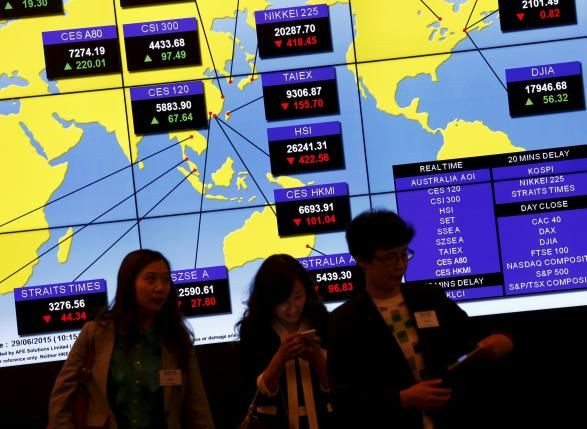Asia Stocks Rise For Third Day Though Greece, China Concerns Weigh

Asian stocks rose for a third consecutive day on Thursday though widening cracks in Chinese stocks and Greece's standoff with its creditors capped gains while the dollar was bolstered by upbeat U.S. economic data.
Stocks in Shanghai slipped more than 3 percent on Thursday in afternoon trade, and it is down nearly 25 percent from a June 12 peak despite the authorities rolling out market supportive measures, including an interest rate cut at the weekend.
Investor sentiment globally will remain cautious in the coming weeks amid uncertainty over whether Greece can step back from an economic abyss after its debt default to the International Monetary Fund, and growing doubts over its future in the euro zone.
Financial spreadbetters expected Britain's FTSE 100 to open around 25 points lower, or 0.4 percent, Germany's DAX to open around 18 points lower, or 0.2 percent, and France's CAC 40 to open around 6 points lower, or 0.1 percent.
MSCI's broadest index of Asia-Pacific shares outside Japan rose 0.2 percent in volatile trade. Tokyo's Nikkei climbed 1.1 percent thanks to a weaker yen, while South Korea's Kospi rose 0.5 percent.
"We are shaping up for a bumpy ride in the summer as the Greek crisis means a risk-on, risk-off approach is seen in the markets," said Tai Hui, chief markets strategist at JP Morgan Asset Management in Hong Kong. "Investors are likely going to move toward a more conservative positioning in their portfolios."
Greek Prime Minister Alexis Tsipras has called a referendum on Sunday that could determine his country's future in Europe. On Wednesday, Tsipras urged Greeks to reject an international bailout deal, souring hopes of any breakthrough.
OFFGUARD
The calling of the referendum caught global investors by surprise even as underlying market volatility has picked up, suggesting that equity positions may come under pressure, according to Barclays strategists.
A popular gauge for measuring market volatility has pulled back from this week's highs but remains at elevated levels.
While U.S. stocks ended up overnight, shares had trimmed intraday gains as Athens refused to soften its stance on bailout terms with its creditors.
"July 5th (day of Greek referendum) is the next key date for the euro and after that July 20th, when Greece owes the European Central Bank 3.5 billion euros," Kathy Lien, managing director of FX Strategy for BK Asset Management, wrote.
"If this payment is missed, the ECB will most likely pull the plug on liquidity to Greek banks, which would have a more dramatic impact than the latest default, leading to increased uncertainty for Greece, the euro and the financial markets as a whole."
The euro came under pressure once more as hopes of a resolution retreated overnight.
The common currency's fall was exacerbated by strong U.S. data, which pushed Treasury yields higher and underpinned the dollar.
On Wednesday, the ADP National Employment report showed that 237,000 private-sector U.S. jobs were created in June, handily exceeding the median expectation in among economists surveyed by Reuters for a gain of 218,000. Construction spending in May was equally strong, hitting the highest level since October 2008.
Investors are now awaiting another batch of U.S. data from durable goods to nonfarm payrolls ahead of a holiday on Friday, in observance of the July 4 Independence Day.
The euro was up 0.1 percent at $1.1068 after losing 0.9 percent on Wednesday. The euro has lost about 1 percent this week.
The dollar was also up against the yen, gaining 0.2 percent to 123.44 and hovering near a one-week high.
In commodities, U.S. crude steadied somewhat after shedding 4 percent overnight on data showing stockpiles in the United States rose for the first time in more than two months.
U.S. crude was little changed at $57.04 a barrel.
© Copyright IBTimes 2024. All rights reserved.




















